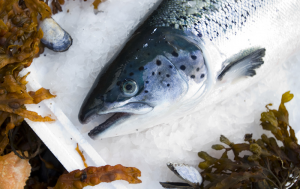The Scottish Salmon Company Reveals £40 Million Expansion Plans

The Scottish Salmon Company has unveiled plans to invest over £40 million to expand its business over the next five years, resulting in the creation of over 100 jobs across the West Coast and islands of Scotland. The Scottish based and operated salmon farming company’s five-year development plan envisages establishing ten new farm sites, increasing farming capacity and developing its harvesting, processing and freshwater operations.
The fully-integrated seafood currently operates from over 50 sites and in 2010 it reported an annual turnover of £92.4 million. In the past two years, the company has more than doubled staff numbers from 160 to 380 and invested £30 million on developments such as refurbishing the Marybank processing facility, acquiring West Minch Salmon, developing new sites and upgrading existing sites. Last year, the company reported it had produced 24,000 tonnes of salmon. Its ambition is to increase this number to 40,000 tonnes in 2016.
 “The Scottish Salmon Company produces premium, fresh Scottish salmon with strong and growing demand in the marketplace. To satisfy this, we require to develop our farming and processing capability,” comments Stewart McLelland, chief executive of The Scottish Salmon Company. “People are key to our vision for expansion. We are keen to bring talent into our business, developing skills, and experience to support our growth plans and that of the overall industry.”
“The Scottish Salmon Company produces premium, fresh Scottish salmon with strong and growing demand in the marketplace. To satisfy this, we require to develop our farming and processing capability,” comments Stewart McLelland, chief executive of The Scottish Salmon Company. “People are key to our vision for expansion. We are keen to bring talent into our business, developing skills, and experience to support our growth plans and that of the overall industry.”
He continues: “We are committed to the communities and economies in which we work and understand the real benefit that developing business and providing employment has in these rural locations.”
Around half the jobs are planned for the Western Isles, with the others in the company’s operational areas throughout the Highlands and Argyll and Bute. The Scottish Salmon Company is currently in the process of scoping, consulting on and lodging planning applications for new fish farming sites.
An infrastructure investment of between £1.5 million and £2 million would be required to develop each of the sites. All sites will be developed to the RSPCA’s ‘Freedom Food’ standard, which governs farming principles such as the stocking density, fish welfare and harvest.

































